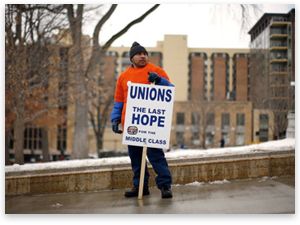Guards' 'Sweetheart Deal' Hits Taxpayers
By JOHN SEILER
In the midst of trying to convince Californians to boost their own taxes by $12 billion, Gov. Jerry Brown showed where his true priorities lie. As the Los Angeles Times reported on the deal he just worked out with the prison guards’ union:
The guards…would be able to save an unlimited number of vacation days under their new deal. When they leave state service, those days could be exchanged for cash at their final pay rate, which would probably be higher than when they earned the time off.
The guards’ union contributed $2 million to the governor’s election campaign last year.
“It’s a sweetheart deal,” Patrick Semmens told me; he’s Deputy Legal Information Director of the National Right to Work Legal Defense Foundation, which works for workers’ rights against union power. “The union was able to put a lot of money into politics. It’s a straightforward political payoff to Jerry Brown.
“I was shocked,” Jack Dean said of the governors deal with the guards’ union; he runs the Pension Tsunami Web site, which monitors the immense cost of government-worker pensions. “The deal is not aimed at making any monetary goal, but at placating the unions. The taxpayer never seems to get a break. There’s a tendency, among Republicans as well as Democrats, to deal with a problem by raising taxes rather than cutting spending.”
Semmens added that Brown “seems more concerned about keeping union money funneled into his campaign, rather than the interests of the taxpayers. It shows why forced union dues should not be in politics. It shows how, when unions win, taxpayers lose.”
National Right to Work favors ending the coercion of unions automatically taking money from workers’ pay for political campaigns. In California, union members can get their money back only after a cumbersome process. And for government-worker unions, the union dues actually come from money taken from taxpayers.
In 2005, voters defeated Proposition 75, which would have given union workers the right to keep all the money of own paychecks, with political contributions becoming totally voluntary. According to Ballotpedia, “Prop. 75 was an example of a paycheck protection ballot measure. In 1998, another paycheck protection measure (Proposition 226) was on the ballot; it, too, was defeated.”
Prop. 75 lost by a fairly close margin, 54 percent to 46 percent. It was defeated only after a massive $54 million anti-75 campaign funded by the unions, compared to just $6 million spent by pro-75 reform forces. That was nearly a 10 to 1 ratio of pro-75 forces being outspent by anti-75 forces.
The guards union — officially the California Correctional Peace Officers Association — spent a total of $193,458 on anti-75 efforts.
The 2005 vote came at the height of the real-estate boom, when the budget was bursting with tax revenue, and before the pension crisis struck the state. A vote today on something similar to Prop. 75 might turn out differently.
“Once people are on the dole, they find it hard to get off,” Dean said of the well-compensated union workers. “It’s just the continual expansion of government.”
Related Articles
CA regulators to punish VW
Amid a broad crackdown on Volkswagen by federal authorities and state attorneys general, California officials moved to pursue the strictest
Few Heed State Business Study
Jan. 18, 2020 By KATY GRIMES A small business study published September 2009 by the Governor’s Office of Small Business
State agency loses again in bid to expand clout of collective bargaining
For the second time in five years, state courts have rejected attempts by the California Public Employees Relations Board to





